- Home
- James Herriot
James Herriot's Dog Stories
James Herriot's Dog Stories Read online
To my youngest grandchild
Katrina, with love
Contents
Introduction
1. Tricki Woo
2. Tristan’s Vigil
3. A Triumph of Surgery
4. Have a Cigar
5. Maternal Instincts
6. Dan – and Helen
7. Tip
8. The Card over the Bed
9. Clancy
10. Mrs Donovan
11. The Darrowby Show
12. A Momentous Birth
13. Jock
14. Sexual Harassment
15. Granville Bennett
16. Abandoned
17. Penny
18. Cindy
19. Only One Woof
20. The Dimmocks
21. Magnus and Company
22. Last Visit
23. Cedric
24. Wes
25. The Bandaged Finger
26. Shep’s Hobby
27. Mick
28. Strychnine
29. Locum
30. Kim
31. The Flapping Track and Success Against the Odds
32. Mr Pinkerton’s Problem
33. Kind Hearts and Country Vets
34. Jingo and Skipper
35. Seth Pilling and His Little Knowledge
36. The Stray
37. The Stolen Car
38. Theo the ‘Pub Terrier’
39. Digger
40. The Great Escape
41. Roddy Travers and Jake
42. Nip and Sam
43. Judy the Nurse Dog
44. Myrtle
45. Venus
46. Amber
47. Counting Blessings
48. Rip
49. Ruffles and Muffles
50. The Dustbin Dog
Introduction
As I look through the pages of this book I have the impression of a wheel turning full circle. As a child, I was fascinated by dogs and had a burning ambition to be a dog doctor, then I spent a lifetime treating the ailments of cows, horses, sheep and pigs, yet here I am, in my twilight years, bringing out a volume of my dog stories. I feel that an explanation rather than an introduction is necessary.
The story is quite a simple one. My boyhood in Glasgow was very much involved with dogs – my own and other people’s. Living in the extreme west where the city sprawl thinned out into the countryside, I could look from my windows on to the Kilpatrick Hills and Campsie Fells in the north and over the Clyde to Neilston Pad and the hills beyond Barrhead to the south. Those green hills beckoned to me and though they were far away I walked to them. Through the last straggle of houses to the summits from which I could see the lochs and mountains of Argyll. Immense distances they seem to me now when I look back – often over thirty miles in a day – and Don was always with me. He was an Irish Setter, lean, glossy and beautiful, and he shared my joy in the countryside.
Usually my school friends came with me and on those long sunny days much of the pleasure came from watching our dogs enjoying themselves and playing together. And even at that early age, I was intrigued by the character and behaviour of these animals. I could never quite take dogs for granted. Why were they so devoted to the human race? Why should they delight in our company and welcome us home in transports of joy? Why should their greatest pleasure lie in being with us in our homes and wherever we were? They were just animals after all and it seemed to me that their main preoccupation ought to be in seeking food and protection; instead they dispensed a flow of affection and loyalty which appeared to be limitless.
And another thing. There were so many different shapes, sizes and colours, yet they all had the same fundamental characteristics. Why, why?
I consulted my favourite reference book, Arthur Mee’s Children’s Encyclopaedia, and I wasn’t surprised to learn that dogs had been cherished friends of man for thousands of years. The Egyptians loved them and it is probable that they were a happy part of family life in Stone Age caves. I noted, too, that they were thought to be descended from wolves or jackals. All this was interesting but it did not fully explain their appeal and I still marvelled. Behind it all was a vague desire to be always with dogs, to spend my life working with them if possible, but I could never see just how I was going to manage it.
It was when I saw the article in the Meccano Magazine that everything began to crystallise out. VETERINARY SURGERY AS A CAREER. As a vet, I could be with dogs all the time, attending to them, curing their illnesses, saving their lives. It made my head swim.
I was still trying to come to terms with this totally new conception when old Dr Whitehouse, the Principal of the Glasgow Veterinary College, came to my school to talk to us. It must be heartbreaking to the hundreds of young people who now are struggling in vain to gain entry to a veterinary school to know that in those days these institutions were going round begging the boys and girls to come to them. The reasons were simple. In 1930, the country was in the grip of a terrible economic depression, people could not afford to keep pets on anything like the present day scale and, perhaps most important of all, the draught horse, once the glory and mainstay of the veterinary profession, was rapidly disappearing from the streets and fields. Nobody wanted vets.
Dr Whitehouse, however, refused to accept that the profession was in its death throes. He told us that if we became veterinary surgeons we would never be rich, but we would have a life of infinite variety, fulfilling in many different ways.
I was hooked. I knew now exactly what I wanted to do with my life, but the obstacles seemed enormous. This was a scientific profession and I was certainly not a scientific type. The things I was good at in school were English and languages and I had already split off from the pupils who were doing such things as physics and chemistry. And I was nearly fourteen years old – in about eighteen months I would be taking my ‘highers’, which were the A-level examinations in Scotland. It was too late to change now.
There was only one thing to do. I went up to the College to talk to Dr Whitehouse. He was a wonderful old man, a strong, benign personality with a gentle sense of humour. He listened patiently as I poured out my problems.
‘I love dogs,’ I told him. ‘I want to work with them. I want to be a vet. But the subjects I am taking at school are English, French and Latin. No science at all. Can I get into the college?’
He smiled. ‘Of course you can. If you get two highers and two lowers you have the matriculation standard. It doesn’t matter what the subjects are. You can do physics, chemistry and biology in your first year.’
This again must seem incredible to modern students, but it was a lifeline to me. ‘Oh, I’m pretty sure I can get three highers.’
That’s fine, then,’ he said. ‘You’ve nothing to worry about.’
I hesitated: ‘I’ll have to try hard to get lower maths. I’m terrible at maths – will I need them to be a vet?’
His smile widened ‘Only to add up your day’s takings,’ he replied.
That was it, then. My goal was fixed and clearly in front of me. I worked hard in my fourth and fifth year and it is wryly amusing to me now to think of the hours I spent boning up on those apparently useless subjects. Particularly Latin. I loved Latin and most nights I sat poring happily over Virgil, Ovid and Cicero. Towards the end, I think I could have carried on an intelligent conversation with an Ancient Roman, but the thought kept obtruding – what possible use is all this going to be to me as a veterinary student? Some people were encouraging. ‘Oh, it will help you to understand a lot of the medical terms,’ they said.
I believe it did, but I’d have been a lot better learning about biology.
As I hoped, I got my three highers and actually managed lower maths. I am s
uch a total numbskull at the subject that I can’t believe I really passed, but they used to say that if you got higher Latin they would give you anything, so maybe that is what happened. At the time, I wasn’t worried. My foot was on the ladder. I was a student at the Glasgow Veterinary College. I was on my way to being a dog doctor.
And I knew exactly what kind of a dog doctor I would be. During the summer holidays between leaving school and going to the College, I carried a vision with me. I could see myself quite clearly, standing masked and gowned in a gleaming operating theatre. I was surrounded by nurses and on the table lay a dog which I was restoring to health by brilliant surgery. Or sometimes I was in a white coat under the spotless walls of a consulting room, ministering to a series of dogs, large, small, tail-wagging, woebegone, but all enchanting and all in need of my services. It was a heavenly prospect.
However, when I rolled up to the College with the new students to start the autumn term, I found that the authorities had no intention of encouraging me in my ambition. They had other plans for me. They were going to make me into a horse doctor.
Veterinary education had stood still despite the fundamental changes which were taking place and all our studies were geared to the horse. The order of priorities, as set out, was quite clear. Horse, ox, sheep, pig, dog. It was a little jingle, repeated over and over and pumped into us as we read our text books. Sisson’s great tome, The Anatomy of the Domestic Animals, provided exhaustive descriptions of the bones, muscles, digestive system, etc. of the horse, then perhaps about a fifth of the space to the ox and so on down sheep, pig, to the poor dog pushed in at the end.
It was the same with the important subject of Animal Husbandry. When I look through the yellowing pages of my text book of more than fifty years ago, I see that nearly all of it deals with the casting of horses, conformation, stable management, grooming, clipping, harness and saddlery and an enormous amount on shoeing. We had to learn how to shoe a horse, how to remove the old shoe and hammer on a new one. We spent hours in the acrid smoke of blacksmiths’ shops. And we were expected to know how to harness a cart horse without making a mistake; collar, hames, harness – saddle and breeching, bridle and reins and belly band.
All this was a surprise to me but another surprise was the totally different attitude towards working and learning. At Hillhead High School, I had been accustomed to a strict regime. Academic standards were high and the teachers there took their job seriously. They were quite determined that we would master our subjects and any slackness was quickly followed by a few strokes of the leather ‘tawse’. But now I found I had been transported into a world where nobody seemed to care whether we learned anything or not.
The present day Veterinary School of Glasgow University is rightly regarded as one of the best in the world with every modern amenity and many brilliant men among its professors. The Glasgow Veterinary College of fifty years ago was very different.
It was a long, low, delapidated building in a raffish quarter of the city and I was told that it was once used as the stables for the horses when the Glasgow tram-cars were horse-drawn. It certainly looked like that. In an attempt to improve its appearance it had been painted a sickly yellow, but it didn’t help.
In the late twenties, the government, faced with the declining demand for vets, had decided to close the Glasgow College and had withdrawn the financial grant. However, a board of governors banded together in an attempt to keep the place going and when I arrived they were still just hanging on, doing everything on a shoe-string.
Our teachers, with a few exceptions, were old, retired practitioners. Some of them were very old indeed – deaf, short-sighted, not particularly interested in what they were doing. The professor of Botany and Zoology did his job simply by reading aloud from a text book. Quite often he would turn over two pages by mistake but never noticed until the class drew his attention to it by a series of yells, when he would look over his spectacles at us, smile indulgently and turn the page back, quite unabashed. We were very fond of him and cheered him to the echo at the end of every lecture when he never failed to make the same little joke.
‘Well, gentlemen,’ he would murmur, forgetting that there was actually one girl among us. ‘I see by my gold watch and chain that our time is up.’ He always accepted our standing ovation graciously.
The students, too, were different. Many of them were farmers’ sons, some from the far north and the Hebrides. I really took to these highland boys, polite, earnest, hairy-tweeded lads whose softly accented voices dropped easily into the Gaelic when they were talking together. The rest were city boys like myself from all over Britain.
My biggest shock was to find that some of them had been at the College for a surprising length of time without making much progress. One chap, McAloon by name, had been there for fourteen years but had managed to get only as far as the second year in the curriculum. He held the record at the time but many others were into double figures. The explanation was simple. The College was desperate for money. There were no student grants and no question of being thrown out after failing an exam, so as long as their parents would cough up the fees regularly, these veterans were valued members of the community. The fourteen-year man was held in particularly high esteem and when he finally left to join the police force, he was sadly missed. Old Dr Whitehouse, who lectured in Anatomy, was visibly moved at the time.
‘Mr McAloon,’ he said, putting down a horse’s skull and pointing with his probe at an empty place, ‘has sat on that stool for eleven years. It is going to be very strange without him.’
The long-stay students formed a happy group and appeared to spend much of their time playing poker on top of a cut-down grand piano in the common-room. Incidentally, there were never any highlanders among them. The boys from the far north attended all the lectures, lived in Glasgow tenements on porridge and salt herrings and won medals at the end of the year.
As part of our equine education, we were initiated into the ‘principle of horse-mastership’, which comprised proficiency in handling the animals and also in riding them. Our class was transported once a week to Motherwell where we galloped around the fields on an assortment of nags, thundering down narrow lanes between steel-works like a raggle-taggle cavalry charge, getting mixed up with the traffic in the main streets. Few of the students had ridden before, and since there was not the slightest attempt to break us in gently, we were thrown off in all directions and as we bounced around on our unhelmeted heads, concussions were frequent. My own bout of amnesia lasted several days and really worried my parents who thought everything I had learned at school had gone forever.
In the anatomy lab the main dissection was, of course, done on the horse and the same atmosphere prevailed in the vast and complicated subject of Materia Medica. This is the study of the actions and uses of all the drugs used in the treatment of animal diseases. It is now called Pharmacology and deals largely with antibiotics, sulpha drugs and steroids. But there was not a word about such things in my text book of the thirties. They hadn’t been invented. Instead, as I turn the pages, gently lifting the many pressed flowers my little daughter placed in there thirty years ago, I find an almost endless list of medicaments which are never used now. The Alkalies, the Metals, the Non-metallic Elements, the Acids, Carbon and its Compounds, the Vegetable Kingdom and, in each group, a frightening catalogue of individual drugs with their Latin names, then a description of their actions on the horse, then on cattle, then on sheep and pigs and finally on dogs.
Doctors of humans have to learn only one dosage rate for their patients, but a vet has to know five. And the order of importance is there to see in my ancient book, the same depressing litany. Horse, ox, sheep, pig, dog.
But there was nothing depressing in the general ambience of the College. Instead, there was a glorious insouciance. Nobody seemed to mind whether we attended lectures or not. It was pretty well left to us to decide. Many preferred to play cards on the grand piano and if they did go to a class they took their
game with them. At times it was difficult to hear the droning of the old professors for the chink of coins at the back.
I’m afraid we really plagued these poor old men, shouting, laughing, throwing things around, playing practical jokes. Our professor of Histology was almost totally deaf but he didn’t appear to mind in the least as he mumbled contentedly through his lecture with the hubbub raging round him.
I found all this wonderfully beguiling. It had a warm appeal to me after my strict school days and I was soon drifting happily into the new ways. Since the old stagers round the grand piano welcomed newcomers I began to be a frequent attender at the card games and I very soon decided that poker was the most fascinating of occupations. The only snag was that I lost money. Not only that, but I ran into debt. Besotted by the game, I asked for credit after my travel and dinner money had run out, and after some time I found I owed everybody several shillings with no means of paying.
Ridden with guilt, I studied my position. At the age of sixteen, the cautionary novels of my childhood were fresh in my memory. Eric or Little by Little, The Adventures of a Three Guinea Watch. They told the story of a boy’s slide to perdition through gambling and other evil ways and when I thought of the way I was repaying my hard-working parents by frittering away my youth round that piano, I could so easily apply it all to me. I avoided the card school and started a strict regime of financial economy. I saved bus and tram fares by walking part of the way to the College and lunched exclusively off a single slice of a leaden comestible called apple cake which the canteen purveyed. It cost a penny and successfully killed my appetite for the rest of the day. At length I was able to pay off my dues.
The recipients seemed surprised and not a little amused when I meticulously handed over the money. Their feelings were probably expressed by one big Glaswegian as he pocketed his few shillings. Payin’ gambling debts!’ he chuckled. ‘You’ll come tae a bad end!’
The card playing went on unabated without me, but I still watched from a distance. Indeed, I felt an attachment to these genial characters, veterans of a thousand failed exams, and I still look back on them with affection because you would not find their like today. As the years passed and I progressed through the veterinary course, it saddened me to see most of them gradually fall away. Several left to become salesmen of the new-fangled vacuum cleaners and I often wondered how they had fared. McAloon, the doyen of them all, was obviously nicely settled in the police force because I frequently gave him a wave as he directed the traffic at George’s Cross.

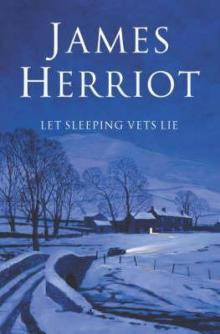 Let Sleeping Vets Lie
Let Sleeping Vets Lie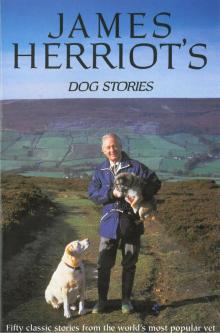 James Herriot's Dog Stories
James Herriot's Dog Stories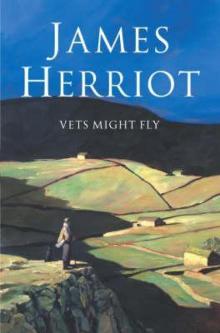 Vets Might Fly
Vets Might Fly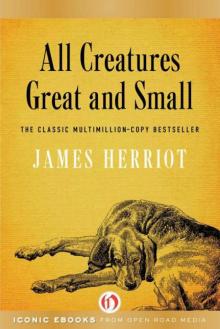 All Creatures Great and Small
All Creatures Great and Small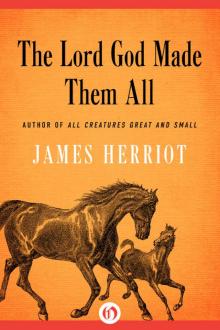 The Lord God Made Them All
The Lord God Made Them All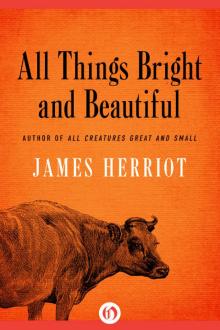 All Things Bright and Beautiful
All Things Bright and Beautiful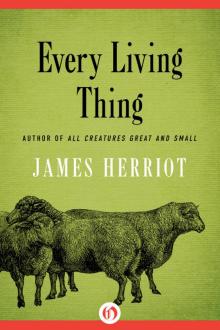 Every Living Thing
Every Living Thing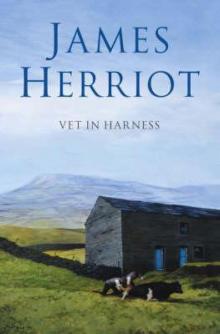 Vet in Harness
Vet in Harness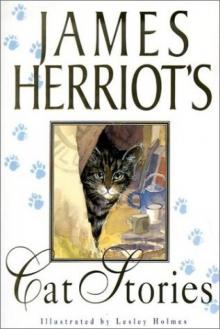 James Herriot's Cat Stories
James Herriot's Cat Stories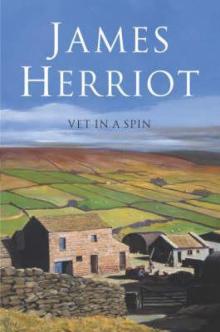 Vet in a Spin
Vet in a Spin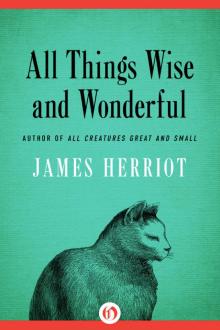 All Things Wise and Wonderful
All Things Wise and Wonderful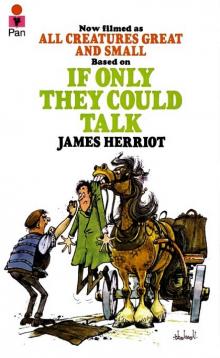 If Only They Could Talk
If Only They Could Talk